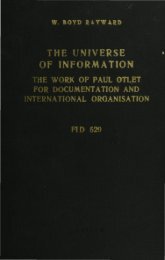User-Centered Evaluation of Information Retrieval - ideals
User-Centered Evaluation of Information Retrieval - ideals
User-Centered Evaluation of Information Retrieval - ideals
Create successful ePaper yourself
Turn your PDF publications into a flip-book with our unique Google optimized e-Paper software.
94 <strong>Evaluation</strong> <strong>of</strong> Public Services fc Personnel<br />
posits information as something constructed by human beings.. ..It focuses<br />
on understanding information use in particular situations and is concerned<br />
with what leads up to and what follows intersections with systems. It focuses<br />
on the users. It examines the system only as seen by the user. It asks many<br />
"how" questions e.g., how do people define needs in different situations,<br />
how do they present these needs to systems, and how do they make use<br />
<strong>of</strong> what system <strong>of</strong>fer them. (p. 16)<br />
Within this paradigm, information needs focus on "what is missing<br />
for users (i.e., what gaps they face)" (p. 17) rather than on what the<br />
information system possesses.<br />
Focusing on the user's information need may lead to a reconsideration<br />
<strong>of</strong> the assumptions underlying library and information systems<br />
and services. As an example, consider Karen Markey's (1984) research<br />
in online catalogs. By observing what users actually do when searching<br />
an online catalog, she discovered that a remarkable number <strong>of</strong> catalog<br />
users were conducting subject or topical searches in the catalog, rather<br />
than known-item searches. Her findings prompted a reconsideration<br />
<strong>of</strong> how libraries approach the study <strong>of</strong> catalogs, and even how they<br />
approach their evaluation and improvement. Catalogs are now seen<br />
as subject access mechanisms, and there have been many proposals as<br />
to how to go about improving subject access in online catalogs. Valuable<br />
as this research is, it has proceeded without a thorough examination<br />
<strong>of</strong> librarians' assumptions about the function <strong>of</strong> the catalog. That is,<br />
there has been no attempt to ascertain what users need the catalog<br />
for, what their purposes are in searching the catalog, what they expect<br />
to find, what need prompts them to approach the catalog or even<br />
the library, for that matter and how and whether it meets those needs.<br />
Until these questions are asked and answers attempted, librarians shall<br />
be bound within the old paradigm that defines an information need<br />
as something that can be satisfied by what is available in information<br />
systems.<br />
USER-CENTERED MEASURES OF<br />
INFORMATION RETRIEVAL<br />
Satisfaction<br />
....satisfaction is determined not by the world but by a declaration on the<br />
part <strong>of</strong> the requestor that a condition is satisfied. (Winograd & Flores, 1987,<br />
p. 171)<br />
It has been suggested that the satisfaction <strong>of</strong> a human user rather<br />
than the objective analysis <strong>of</strong> the technological power <strong>of</strong> a particular<br />
system may be a criterion for evaluation. This is generally not the<br />
position that has been taken by library and information researchers,
















